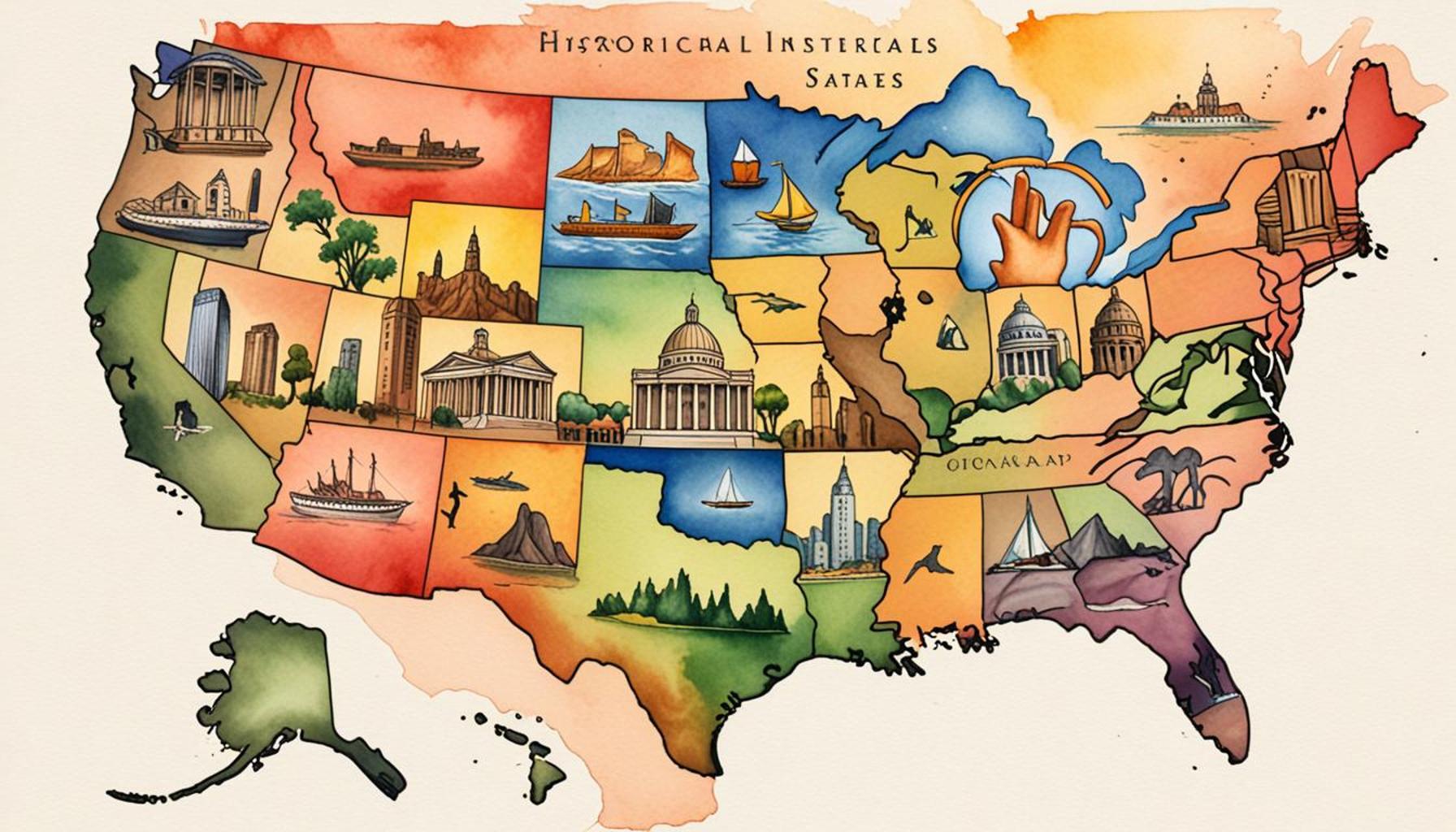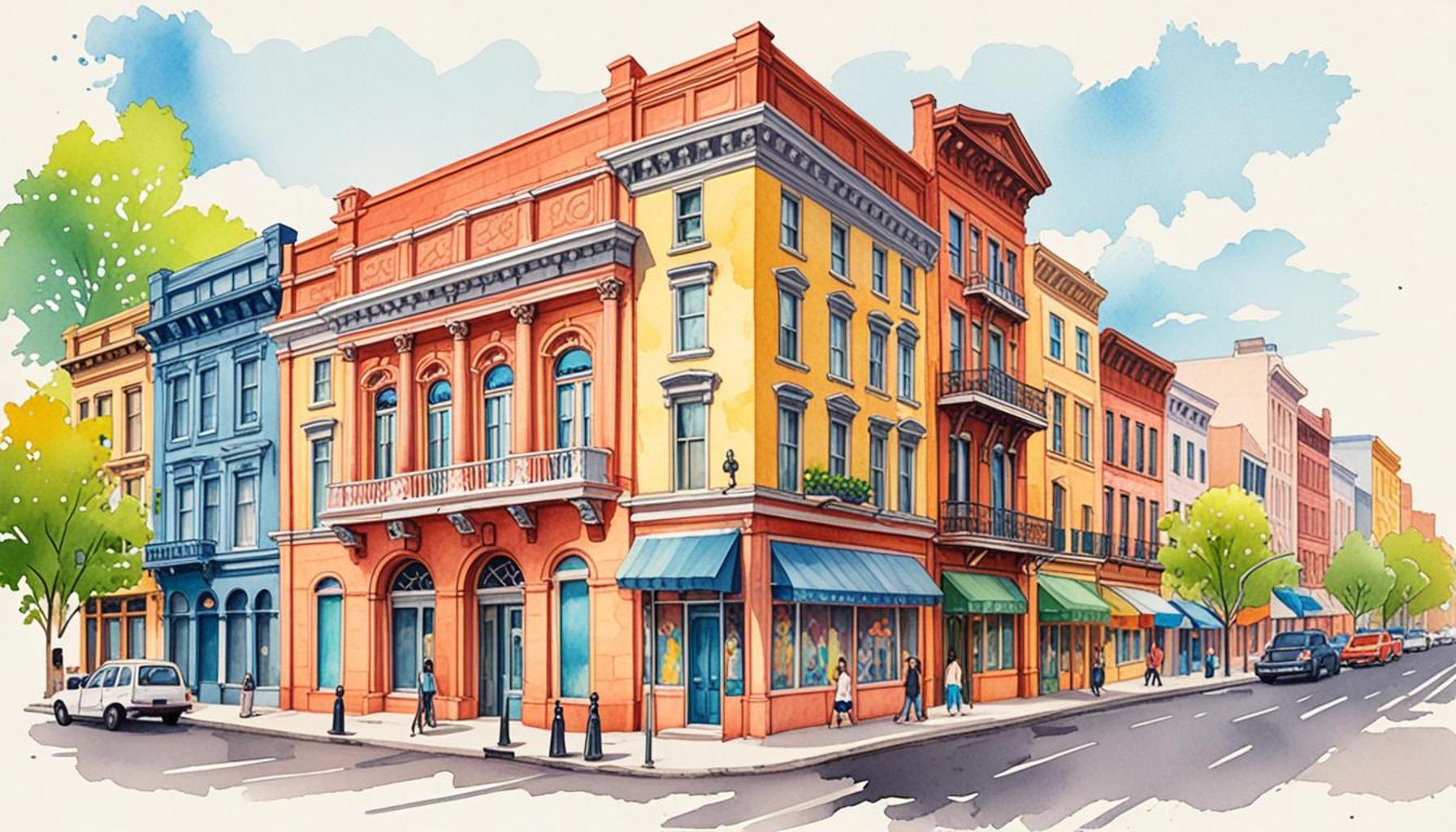Historical Heritage Tours: Discovering the Cultural Roots of the United States

Unveiling the Past Through Heritage Tours
Across the vast landscapes of the United States, a rich tapestry of history waits to be discovered. Historical heritage tours provide unique opportunities for travelers to explore the cultural roots that shaped the nation. These journeys not only reveal the stories of our past but also connect us with the diverse communities that contribute to America’s identity.
Why Choose Historical Heritage Tours?
- Engaging Experiences: Walk through the halls of historic sites and immerse yourself in the tales of resilience, innovation, and culture. For instance, many tours include interactive elements, allowing visitors to engage with reenactors who bring historical events to life, making the experience more vivid and memorable.
- Diverse Destinations: From colonial settlements to Native American heritage sites, every location offers a unique perspective. Whether wandering through the rustic streets of Salem, Massachusetts, steeped in witch trial history, or exploring the vibrant art markets of Santa Fe that reflect the rich tapestry of Hispanic heritage, there is a plethora of experiences waiting to be uncovered.
- Educational Insights: Gain deeper knowledge about the struggles and triumphs of those who came before us. As participants learn about key events, such as the Underground Railroad in Ohio or the civil rights movement in Selma, Alabama, they are not only absorbing facts but also engaging in meaningful conversations about social justice and equality.
Each state boasts its own heritage sites, such as:
- Boston: The Freedom Trail, a path through pivotal events of the American Revolution, where visitors can trace the steps of historical figures like Paul Revere and John Adams.
- Philadelphia: Independence Hall, where the Declaration of Independence was signed, stands as a monument to democracy and showcases the United States’ founding ideals.
- New Mexico: Taos Pueblo, a UNESCO World Heritage site embodying Native American culture, offers a glimpse into ancient traditions and communal living that have withstood the test of time.
These tours do more than just tell history; they create connections to our shared human experience. Travelers often leave with a renewed appreciation for the sacrifices and achievements of those who came before them. As you embark on a historical heritage tour, you carry forward the stories of yesterday into tomorrows yet to be written. These narratives shape our understanding of national identity and personal heritage, prompting further reflection and dialogue about the paths that have led us here.
In addition, many heritage tours are led by knowledgeable guides who can enrich the experience with anecdotes and lesser-known facts, ensuring that participants leave with not just memories but also a deeper understanding of the American story. Whether you are a history buff or a curious traveler, there is a well of knowledge to tap into on a heritage tour that can inspire, educate, and foster a sense of community across generations.
DIVE DEEPER: Click here to discover the rich history and architecture of American cities
Exploring America’s Heritage through Immersive Tours
In a country marked by diverse waves of immigration, resourcefulness, and a rich array of cultures, historical heritage tours offer an unparalleled glimpse into the narratives that define the United States. These tours provide not only a journey through time but also an exploration of the traditions, struggles, and triumphs that have shaped communities across the nation. From bustling cities to serene small towns, each destination invites travelers to uncover the stories that have etched their history into the American landscape.
Key Historical Destinations to Experience
Heritage tours cover a wide spectrum of locations that highlight the multifaceted nature of American history. Each site serves as a portal into different periods, capturing the essence of the land and its people. Some must-visit destinations include:
- Savannah, Georgia: Renowned for its picturesque historic district, Savannah offers a journey through the antebellum South, showcasing beautifully preserved architecture and riveting tales of the Civil War. The haunting stories passed down through generations add to the city’s eerie charm.
- Washington, D.C.: The nation’s capital is a treasure trove of historical landmarks, including the iconic Lincoln Memorial and the National Mall. Guided tours help illustrate the profound impact of political events on the fabric of American society, particularly during monumental moments such as the Civil Rights Movement.
- New Orleans, Louisiana: This vibrant city is a melting pot of cultures, from French to Spanish to African influences. Heritage tours delve deep into the roots of jazz, Creole cuisine, and the unique rituals that make New Orleans a cultural landmark, providing an understanding of its historical significance.
- Ford’s Theatre, Washington, D.C.: Steeped in the tragic history of President Abraham Lincoln’s assassination, Ford’s Theatre invites visitors to grasp the political and social upheaval of the time. The accompanying museum elements provide context and depth to this pivotal event in American history.
While each of these destinations tells its own unique story, there are overarching themes that unite them—struggles for freedom, cultural assimilation, and the pursuit of a more perfect union. Historical heritage tours encourage reflection on these critical themes and inspire participants to consider their own place within the continuum of U.S. history.
As travelers embark on their journey through America’s past, they will encounter interactive museums, reenactments, and engaging discussions that breathe life into these stories. Knowledgeable guides often stand as storytellers, sharing personal anecdotes and drawing connections between historical events and present-day issues. This engaging narrative style fosters a deeper connection to the places visited and aids travelers in creating a personal relationship with history.
Ultimately, historical heritage tours transcend mere sightseeing; they cultivate a shared understanding of our national narrative. Through these explorations, participants not only gain enlightenment about past events but also develop empathy for the diverse experiences that root the contemporary American identity.
| Advantage | Description |
|---|---|
| Educational Experience | Historical heritage tours offer a unique opportunity to delve into the rich history and cultural diversity of the United States. |
| Connection to Heritage | Participants gain a deeper understanding of their personal and collective past, fostering a sense of pride and identity. |
| Community Engagement | These tours encourage interaction with local communities, promoting a shared cultural narrative that enhances the travel experience. |
| Preservation Efforts | Tours often support historic preservation initiatives, ensuring that future generations can appreciate these cultural landmarks. |
Exploring our historical roots through tours not only educates participants about the past but also strengthens community ties and promotes the significance of preserving our inherited treasures. Each journey into the past opens doors to understanding different cultures that shaped the modern identity of the United States. As participants immerse themselves, they uncover stories that resonate deeply within their own lives. This fusion of education, community engagement, and cultural appreciation creates a compelling narrative that transcends mere sightseeing, making historical heritage tours a vital part of contemporary travel experiences in the United States.
DIVE DEEPER: Click here to discover cultural itineraries
Engaging with History through Varied Experiences
As travelers venture further into America’s rich historical tapestry, heritage tours present diverse experiences that cater to all interests. Whether through guided excursions, self-led explorations, or immersive reenactments, each opportunity invites deeper engagement with the cultural roots that have woven together the nation’s identity. The following examples illustrate how history comes alive in unexpected and fascinating ways.
Interactive Educational Experiences
Many historical sites embrace innovative educational approaches, transforming passive observation into active learning. For instance, Colonial Williamsburg in Virginia allows visitors to interact with costumed interpreters who reenact daily life in the 18th century. This living history experience fades the boundaries between the past and present, enabling participants to handle period artifacts, participate in colonial trades, and explore the socio-political dynamics of the time.
Similarly, the National Underground Railroad Freedom Center in Cincinnati, Ohio, delves into the harrowing journey to freedom for enslaved African Americans. Through powerful narratives, photographic exhibits, and engaging installations, visitors confront the obstacles faced and the resilience shown in the struggle for liberty. Programs often include discussions led by scholars and activists, connecting historical struggles to contemporary issues of social justice.
Explorations Beyond the Ordinary
While traditional tours follow popular itineraries, many heritage tours go off the beaten path, uncovering lesser-known yet equally significant locations. For example, a visit to the Amana Colonies in Iowa reveals the story of a communal society established by German immigrants seeking religious freedom. These preserved villages present an authentic glimpse of shared living, artisan trades, and communal governance, enriching visitors’ understanding of how these factors shaped American life.
- The Lewis and Clark National Historic Trail: Trail enthusiasts can retrace the steps of explorers Meriwether Lewis and William Clark, whose expedition facilitated westward expansion. Guided expeditions often include canoe trips along sections of the Missouri River, allowing participants to explore the same breathtaking landscapes that inspired early American pioneers.
- The Historic Route 66: A travel route that embodies the American spirit, Route 66 takes adventurers through iconic diners, roadside attractions, and historic motels from Chicago to Santa Monica. This journey is not just about the destination but also about the stories of resilience, innovation, and the cultural shifts experienced along the way.
Connecting Heritage with Modern Audiences
One of the most significant aspects of historical heritage tours is their ability to connect with modern audiences through contemporary narratives. Many sites incorporate digital technology to enhance the visitor experience, including augmented reality apps that allow guests to visualize the historical context of locations as they navigate the area.
Programs like the African American Cultural Heritage Action Fund aim to identify and preserve historical sites significant to African American history. This initiative brings to light stories often overlooked in traditional narratives, ensuring that all voices are heard and honored. Using tours that offer insights into the cultural contributions of African Americans, travelers can have transformative experiences that resonate with our current social climate.
By participating in such heritage tours, individuals engage in an exploration that goes beyond mere entertainment. They connect with the past in deeply personal ways, fostering a sense of belonging and responsibility towards preserving America’s rich cultural roots.
DIVE DEEPER: Click here to learn more
Conclusion: Embracing the Legacy of American Heritage
In conclusion, historical heritage tours serve as a vital bridge connecting the past with the present, providing invaluable insights into the rich tapestry of American culture. From the immersive experiences found at sites like Colonial Williamsburg to the profound narratives presented at the National Underground Railroad Freedom Center, these tours allow individuals to engage with history in meaningful ways. Each unique journey reveals stories of resilience, innovation, and the diverse contributions that shape the American identity.
As travelers explore both famous landmarks and lesser-known locales like the Amana Colonies or the winding paths of Route 66, they not only discover their cultural heritage but also develop a deeper appreciation for the shared history that binds diverse communities together. Moreover, the integration of modern technology into these experiences enhances the accessibility of historical narratives, ensuring that future generations remain connected to their roots.
Engaging with historical heritage is more than an educational pursuit; it is a personal journey that fosters empathy, understanding, and a sense of responsibility toward the preservation of these narratives. Thus, as we venture into the rich landscapes of America’s past, let us embrace these opportunities to celebrate our cultural roots and honor the legacies that define us. Exploring historical heritage tours is not just a communal rediscovery; it is an invitation to reflect on how the echoes of history continue to influence our lives today.


